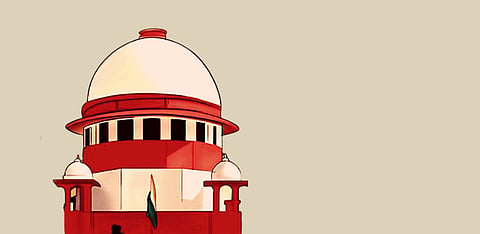

In 2014, the petition filed by the convict in the 2000 Red Fort attack case, Mohd. Arif, and heard by a Constitution bench, was successful in ensuring that the review petitions of death row convicts are heard by a minimum of three judges of the Supreme Court in an open court – a safeguard which resulted in the commutation of several death sentences into life imprisonments. However, on Thursday, Mohd. Arif himself failed to become a beneficiary of the reform which his petition had earlier achieved.
—
THE Supreme Court on Thursday affirmed the death sentence awarded to Mohd. Arif, an accused in the 2000 Red Fort attack in which three Army jawans had lost their lives. The Court opined that there was a direct attack on the unity, integrity and sovereignty of India, which completely outweigh the factors which may even remotely be brought into consideration as mitigating circumstances on record.
A bench comprising Chief Justice of India(CJI) Uday Umesh Lalit and Justices S. Ravindra Bhat and Bela M. Trivedi was ruling on a review petition filed by the death row convict against the decision of the Supreme Court on August 10, 2011, whereby it had affirmed the death sentence imposed upon Arif.
According to the prosecution, on the night of December 22, 2000, some intruders entered the area where the Unit of 7 Rajputana Rifles of the Indian Army was stationed inside the Red Fort, New Delhi. In the firing that was opened by the intruders, three Army jawans lost their lives. The intruders then left by scaling the rear side boundary wall of the Red Fort.
On October 31, 2005, the Court of Additional Sessions Judge, Delhi awarded the death sentence to Arif. On September 13, 2007, the High Court of Delhi affirmed the decision of the Trial Court. The matter then reached the Supreme Court in the form of a Criminal Appeal. However, the challenge was negated by the Supreme Court and the award of the death sentence to the petitioner was affirmed on August 10, 2011. The review petition filed by Arif was dismissed on August 28, 2012, and the curative petition was dismissed on January 13, 2014.
On a writ petition moved by Arif in 2014 came a decision in Mohd. Arif v. Supreme Court of India, (2014) in which it was declared that the death sentence matters should be heard by a bench of a minimum of three judges and the review petitions in such matters ought to be heard in open court. In 2019, the Supreme Court clarified that the benefit of the decision in 2014 would also be applicable in those cases where the review petition was rejected prior to the decision in 2014. Resultantly, Arif's review petition was heard by a three judge bench led by CJI Lalit in the open court.
In the review petition, Arif raised four grounds namely:
On the issue of Section 65B of the Evidence Act, the bench decided to eschew the electronic evidence in the form of Call Detail Records (CDRs) which was without any appropriate certificate under Section 65-B(4) of the Evidence Act. However, it noted that even after eschewing circumstances that were directly attributable to the CDRs relied upon by the prosecution, the other circumstances on record do clearly spell out and prove beyond any doubt the involvement of Arif in the crime in question.
On the issue of disclosure statements and recovery of ammunition, the bench held that these issues are purely factual in nature.
"The disclosure statement, as a matter of fact, was held to have been proved by the Courts below and this Court. In our review jurisdiction, it will not be possible to enter into questions regarding admissibility of such disclosure statement on issues of fact. The disclosure statement led the police to the hideout at G-73, Batla House, New Delhi and when the police team arrived with the review petitioner, there was firing upon the police team as stated in circumstance 'g' in paragraph 182. After the person concerned named Abu Shamal alias Faisal died in the encounter, certain firearms and ammunition were recovered. The submission that such recovery of ammunition or the encounter of Abu Shamal could not be associated with the disclosure statement of the review petitioner is not quite correct", the bench held.
On the possibility of retribution, the bench observed "there is nothing on record which can be taken to be a mitigating circumstance in favour of the review petitioner. The suggestion that there is a possibility of retribution and rehabilitation, is not made out from and supported by any material on record. On the other hand, the aggravating circumstances evident from the record and specially the fact that there was a direct attack on the unity, integrity and sovereignty of India, completely outweigh the factors which may even remotely be brought into consideration as mitigating circumstances on record". The bench thus dismissed the review petition.
The Delhi High Court in its judgment had inter-alia found that the Mobile Phone No. 9811278510 was used for making calls to the two BBC correspondents immediately after the shooting incident inside Lal Quila and the caller had claimed the responsibility for that incident and had informed them that the incident was the job of Lashkar-e-Toiba. This mobile number, the high court found, written on a piece of paper lying behind Lal Quila which had led the police up to Flat No. 308-A, Ghazipur, New Delhi where accused Mohd. Arif alias Ashfaq was found to be living and when on being suspected of being involved in the shooting incident he was apprehended on the night of 25-12- 2000/26-12-2000 one pistol and some live cartridges were recovered from his possession for which he did not have any licence. High Court had also said that Arif was a Pakistani national and had entered the Indian territory illegally.
Click here to read the judgment.